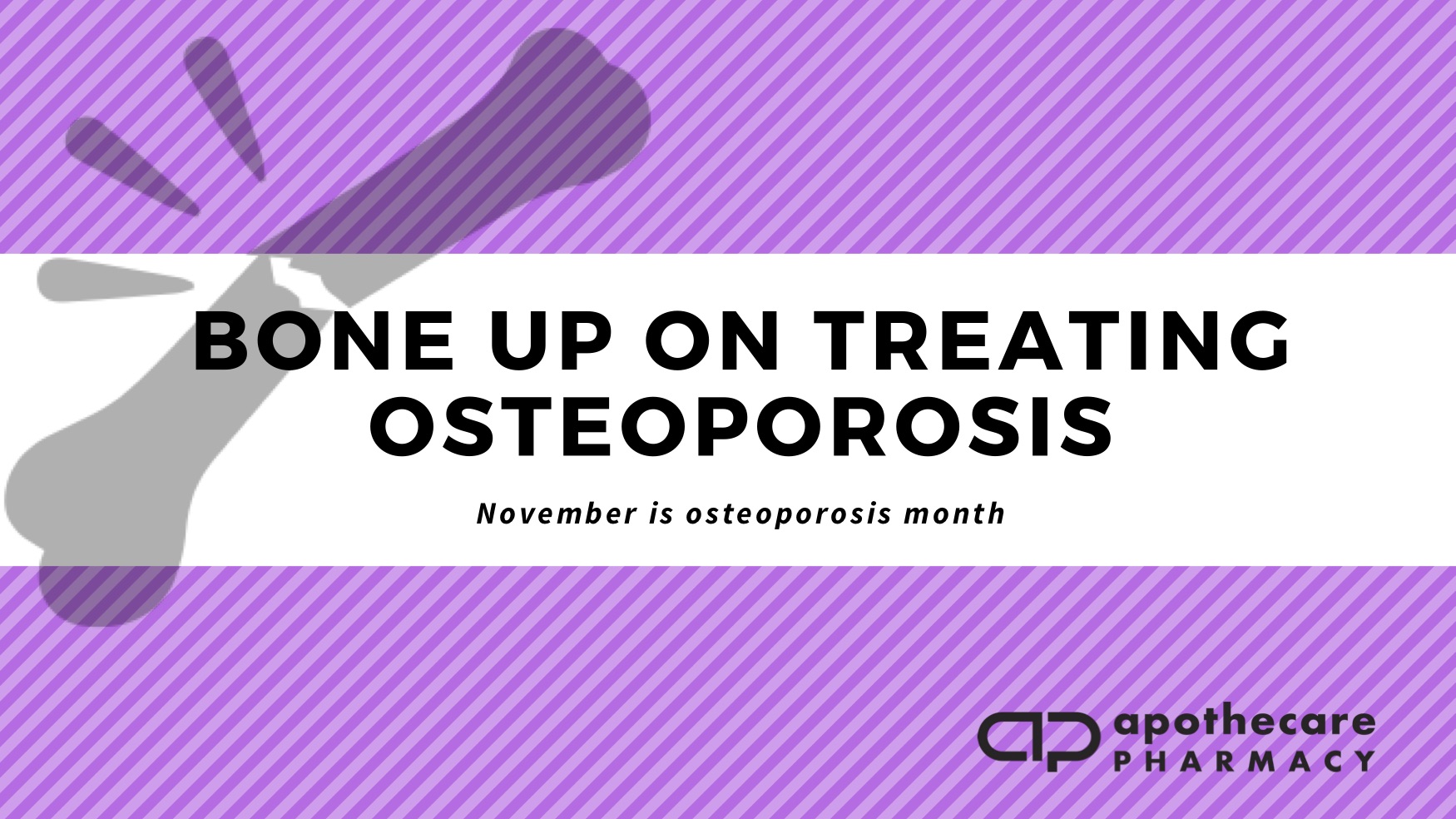November is Osteoporosis Month! We’ve put together some information to let you know what osteoporosis is and what you can do to treat, or prevent it. The goal of osteoporosis month is to raise awareness so that people can try to prevent problems before they arise.
What is it?
Osteoporosis is a condition which causes your bones to become weak, and more likely to break or fracture. This can happen from the body losing too much bone, not making enough bone or a combination of the two. Osteoporosis happens slowly over time, and is most common in older frail women. In fact 1 in 4 Canadian women over the age of 50 will be affected by osteoporosis. Certain medications may also increase your risk of breaking a bone by 1) directly affecting your bones causing bone loss or 2) causing you to feel unbalanced which increases your risk of having a fall. Make sure you speak with your doctor or pharmacist to identify these medications.
How do I know if I have it?
You cannot feel osteoporosis and many people will not have any signs or symptoms. It may not be until you experience a broken bone, or have a bone density test (a test which measures the strength of your bones) that you find out you have osteoporosis. Early detection is important to prevent complications and the associated pain from a broken bone. A bone mineral density (BMD) test is painless and the best way to determine your risk for osteoporosis (check out the link at the end to find out when you need a bone density test).
 So what happens next? How do you prevent a broken bone?
There are two main ways to help increase your bone strength, and often they will work best if you do them at the same time.
So what happens next? How do you prevent a broken bone?
There are two main ways to help increase your bone strength, and often they will work best if you do them at the same time.
Have questions about bone density tests? Check out this article from Choosing Wisely Canada. (https://choosingwiselycanada.org/bone-density-tests/)
Want to find our how much calcium is in your food? (https://www.dietitians.ca/getattachment/f739d485-d113-4a46-8122-eb2d33730c64/FACTSHEET-Food-Sources-of-Calcium.pdf.aspx)
Want to read more about osteoporosis or use an online calcium calculator? Check out the Osteoporosis Canada website (https://osteoporosis.ca/)
Let us know if you still have questions, and remember when choosing a calcium supplement that the body can only handle about 500mg of elemental calcium at a time, so taking large doses at once isn’t usually helpful. Let us know if you need a hand choosing supplements!
 So what happens next? How do you prevent a broken bone?
There are two main ways to help increase your bone strength, and often they will work best if you do them at the same time.
So what happens next? How do you prevent a broken bone?
There are two main ways to help increase your bone strength, and often they will work best if you do them at the same time.
| Natural methods to increase bone density | Drugs which can increase bone density |
|---|---|
| · Making sure you are getting enough calcium and vitamin D in your diet (examples include milk, cheese, broccoli, tofu, almonds, canned salmon) · Weight bearing exercise- examples include walking, jogging, hiking, dancing, start slow and increase. If you are unsure if you should be exercising talk to your doctor or pharmacist first. · Avoid or limit products that can decrease bone density such as caffeine or alcohol. · Quit smoking! (we can help with that) · Avoid medications like proton pump inhibitors if possible (pantoprazole, lansoprazole, omeprazole) as they may decrease calcium absorption (Ask your pharmacist about other medications which can decrease your bone density such as steroids) | 2 common medications to treat osteoporosis: · Bisphosphonates- A class of oral medications which are taken, usually weekly or monthly. This medication works by slowing the loss of your bone so its important to still get vitamin D and calcium in your diet to increase your bone growth. Examples of these medications include Actonel (generic name is risedronate) or Fosamax (generic name is alendronate) · Prolia- an injection that you would get every 6 months to increase your bone mass |

